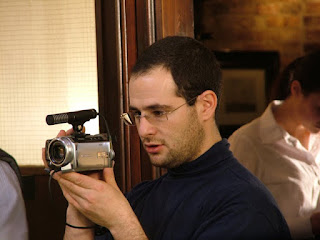 By Dan Parkes (Director)
By Dan Parkes (Director)When we began work on Ambleton Delight we soon realised it was ambitious enough to warrant some form of documentation (...a feature film with a named actor, dozens of locations and speaking roles, from pre-to-post in 9 months and on less than £6000...?). However the busy rigors of preparation and organisation meant we did not follow through on it, something we later regretted. We did have a couple of handycams on set at different times and Itsuka Yamasaki (Producer) and Andre Marshall (camera assistant) did film some behind-the-scenes when they had a a rare opportunity. This material can be seen in some of the 7 part Making of series now on YouTube (Part One starts here).
We previously mentioned about having a dedicated stills photographer for at least one of the days, if not all. But also not to be overlooked is to have someone to officially document your behind-the-scenes process on video. Having a film that is about how you made the film is something that is not only going to be of sentimental value; for publicity having an official Making Of that can also later accompany the film on DVD is an essential part of any marketing strategy.
Often film students are crying out for an opportunity to work on a film set for experience. If you do not feel confident enough giving them an actual position in the crew then it is well worth thinking about having them film you making it. Make sure they are aware of what you expect -for example possibly interviewing key members of cast and crew on the day when appropriate.
Tips for organising a Making Of:
- Don't forget to ensure cast and crew contracts include information on also appearing in the Making of, so it is part of their contract
- Have somebody separate from cast and crew organise it (such as a film student)
- Keep them in the loop on the production as much as possible
- Give them a list of not-to-be-missed scenes to film
- Give them a list of cast and crew to interview, with some possible questions if need be
- Ensure they do not interfere with main filming
- Make sure they also follow any legal or health and safety guidelines (such as waivers etc)
- Let them know what you expect as a final product (e.g. a 20 minute Making Of documentary) and also your expectations regarding the quality.






No comments:
Post a Comment